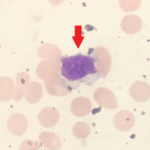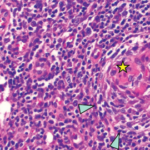Laura Hummers, MD, MSc, provided an update on the extra-pulmonary manifestations of scleroderma & the best ways to approach management of these issues.


Laura Hummers, MD, MSc, provided an update on the extra-pulmonary manifestations of scleroderma & the best ways to approach management of these issues.

ACR CONVERGENCE 2021—Hematologic abnormalities are common in systemic lupus erythematosus (SLE), whether due to SLE itself or something else. As rheumatology professionals, we are routinely challenged by the management of cytopenias in our SLE patients. At the ACR’s annual meeting in 2021, two hematologists shared expert advice regarding common hematologic manifestations of SLE. Michael B….

New concepts in autoimmunity & immunology are being discovered daily in research being conducted to understand the SARS-CoV-2 virus and its implications for rheumatology & all fields of medicine. Here are some insights shared by experts during day 1 of the Basic and Clinical Research Conference.

The Basic and Clinical Research Conference session on Rheumatology Complications of Emerging Viral Infections/SARS-CoV-2 presented findings from numerous studies that help explain some of the idiosyncrasies of COVID-19.

Nam D. Nguyen, DO (Maj., USAF, MC), Erica Hill, DO (Lt. Col., USAF, MC), & Jay Higgs, MD (Col. [ret], USAF, MC) |
Large granular lymphocytic (LGL) leukemia is a rare, chronic, lymphoproliferative disorder of cytotoxic T cell or natural killer cell lineage with an annual incidence of 0.72 cases per 1 million people in the U.S.1 The most common subtype of LGL leukemia, T-LGL leukemia, follows an indolent disease course and accounts for approximately 85% of cases….

Ashraf Raslan, MD, Dorian Infantino, MD, Roman Zuckerman, DO, & Daniel Berlin, MD |
Giant cell arteritis (GCA) is a granulomatous vasculitis of large- and medium-sized arteries, usually affecting the cranial branches of the aortic arch. It is the most common vasculitis, with the highest risk factor being age. Accurate diagnosis and prompt initiation of therapy are of great importance to prevent serious complications, with the most feared being…

Sarah D. Bayefsky, MD, Kimberly DeQuattro, MD, & Rebecca E. Sadun, MD, PhD |
Approximately 50% of young adult patients with childhood-onset rheumatic diseases become lost to follow-up within the first year of transferring to adult rheumatology care, mirroring the statistics of other subspecialties.1,2 One of the challenges cited most consistently by young adult patients and their families relates to differences between rheumatology care delivery in the pediatric and…

Philip Chu, MD, RhMSUS, Mithu Maheswaranathan, MD, Jadee L. Neff, MD, PhD, & Rebecca E. Sadun, MD, PhD |
The difference between Castleman disease and Castleman-like disease may be subtle, but it comes with significant ramifications. Case Presentation This case involves a pregnant 19-year-old woman who presents over multiple hospitalizations with concerns for systemic lupus erythematosus and macrophage activation syndrome. At 36 weeks’ gestation, the patient’s weight had dropped from 215 lbs. to 170…

Increased cardiovascular (CV) risk in patients with rheumatic disease is old news. Over the past decade, a multitude of studies have demonstrated elevated CV risk in a variety of conditions: systemic lupus erythematosus, rheumatoid arthritis and psoriatic arthritis (PsA), to name a few. The risk in patients with rheumatic disease seems to be linked to…

Contraception, disease control, family planning and managing life with an infant—five experts addressed these concerns and more for patients with rheumatic disease during a special online webinar.